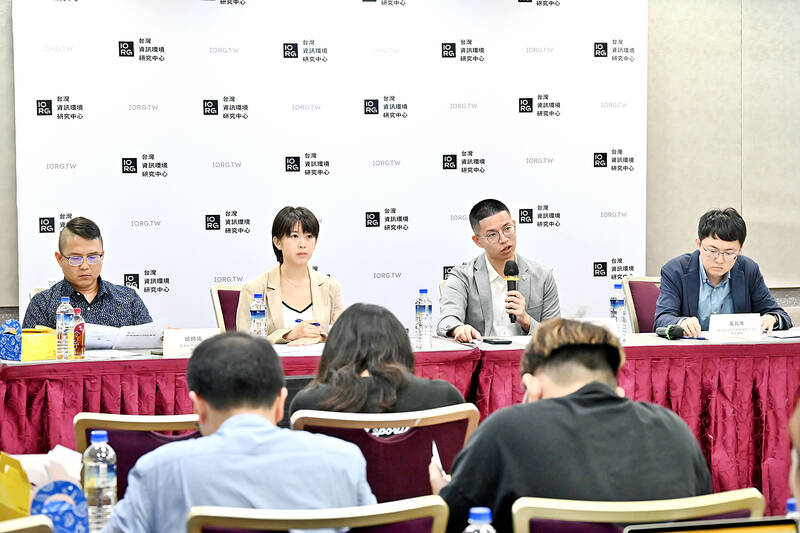More than half of “US skepticism” narratives were created by Taiwan actors, while People’s Republic of China (PRC) actors had strong inclinations to spread such messages, the Information Operations Research Group (IORG) told a news conference yesterday.
The IORG, a civilian research organization working to bolster information literacy and counter authoritarianism, invited experts on cross-strait issues and US-Taiwan relations to share their insights on a report it published last month entitled US Skepticism Narratives and Where They Come From.
Growing ties between the US and Taiwan have fostered skepticism toward the US, which was manifested in “unreasonable or manipulative narratives that suggest that Taiwan should keep a distance from or reduce its relations with the US,” the report said.

Photo: George Tsorng, Taipei Times
In the report, author and IORG codirector Yu Chih-hao (游知澔) analyzed 84 US skepticism narratives over the past three years.
“Collectively, these 84 narratives present an escalation in the harmfulness of both US actions towards Taiwan and its end goal for Taiwan,” he said.
The narratives shifted from an exchange of benefits that ignored Taiwan’s interests in 2021, to a supposed US plan to destroy Taiwan altogether in these two years, he said.
Actors controlled by PRC authorities and media or affiliated organizations were found to be involved in amplifying 70 out of 84 narratives in the report, showing that these actors were more likely to spread US skepticism narratives rather than creating new ones, the report said.
Among the 84 narratives analyzed, 44 were created by Taiwanese actors, indicating “existing collective psychology in Taiwanese society” and explaining their continued circulation, it said.
For example, statements that accused the US of colluding with Taiwanese elites and exploiting Taiwanese reflect partisan polarization in Taiwan, while those that portrayed the US as “the source of chaos and war in the world” reflected war anxiety, it said.
As other PRC propaganda, these narratives shaped China as “a superior alternative” to the US, which is a worldview that might be appealing to some, who could in turn be vulnerable to information manipulation conducted by Beijing to sway elections, Yu said.
Huang Jaw-nian (黃兆年), an assistant professor at National Chengchi University’s Graduate Institute of Development Studies, said that authoritarian regimes tend to create a positive image of themselves by painting competitors negatively.
These regimes use conflicting opinions in democracies to their advantage, he said.
Taiwanese should equip themselves with sharpened media literacy and “literacy on global geopolitics” to form judgements on Taiwan’s relations with the US and China based on factual evidence, he said.
Jasmine Lee (李可心), coeditor of US Taiwan Watch, said that a history of severing diplomatic ties might be the reason Taiwanese are anxious about the nation’s relations with the US.
The two countries share the “double guarantees” of shared strategic goals and democratic values, she said.
Asked about the influence of US skepticism narratives on the presidential election in January next year, Albert Shihyi Chiu (邱師儀), an associate professor at Tunghai University’s Department of Political Science, said that China skepticism greatly outnumbers US skepticism, so it would be difficult for China-leaning stances to win votes.
To combat US skepticism narratives, it is crucial to have “diverse alternatives,” including responses from the US, Huang said.

An essay competition jointly organized by a local writing society and a publisher affiliated with the Chinese Communist Party (CCP) might have contravened the Act Governing Relations Between the People of the Taiwan Area and the Mainland Area (臺灣地區與大陸地區人民關係條例), the Mainland Affairs Council (MAC) said on Thursday. “In this case, the partner organization is clearly an agency under the CCP’s Fujian Provincial Committee,” MAC Deputy Minister and spokesperson Liang Wen-chieh (梁文傑) said at a news briefing in Taipei. “It also involves bringing Taiwanese students to China with all-expenses-paid arrangements to attend award ceremonies and camps,” Liang said. Those two “characteristics” are typically sufficient

A magnitude 5.9 earthquake that struck about 33km off the coast of Hualien City was the "main shock" in a series of quakes in the area, with aftershocks expected over the next three days, the Central Weather Administration (CWA) said yesterday. Prior to the magnitude 5.9 quake shaking most of Taiwan at 6:53pm yesterday, six other earthquakes stronger than a magnitude of 4, starting with a magnitude 5.5 quake at 6:09pm, occurred in the area. CWA Seismological Center Director Wu Chien-fu (吳健富) confirmed that the quakes were all part of the same series and that the magnitude 5.5 temblor was

The brilliant blue waters, thick foliage and bucolic atmosphere on this seemingly idyllic archipelago deep in the Pacific Ocean belie the key role it now plays in a titanic geopolitical struggle. Palau is again on the front line as China, and the US and its allies prepare their forces in an intensifying contest for control over the Asia-Pacific region. The democratic nation of just 17,000 people hosts US-controlled airstrips and soon-to-be-completed radar installations that the US military describes as “critical” to monitoring vast swathes of water and airspace. It is also a key piece of the second island chain, a string of

The Central Weather Administration has issued a heat alert for southeastern Taiwan, warning of temperatures as high as 36°C today, while alerting some coastal areas of strong winds later in the day. Kaohsiung’s Neimen District (內門) and Pingtung County’s Neipu Township (內埔) are under an orange heat alert, which warns of temperatures as high as 36°C for three consecutive days, the CWA said, citing southwest winds. The heat would also extend to Tainan’s Nansi (楠西) and Yujing (玉井) districts, as well as Pingtung’s Gaoshu (高樹), Yanpu (鹽埔) and Majia (瑪家) townships, it said, forecasting highs of up to 36°C in those areas